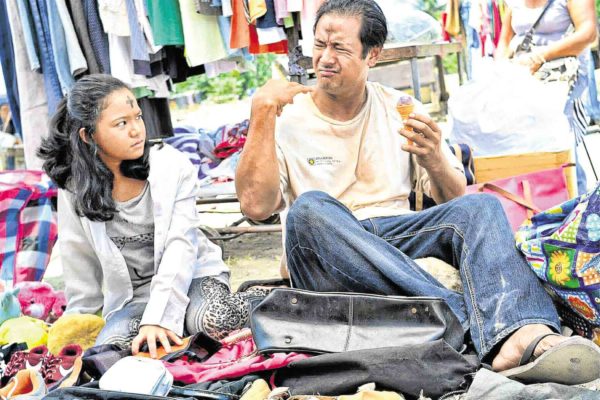Sinag Maynila has had no shortage of gritty themes and noteworthy performances since its inception in 2015.
In its 2017 edition alone, four of the five entries it fielded in the Feature Film category were noteworthy for their diversity and thematic grit: Joel Lamangan’s cracklingly realized “Bhoy Intsik,” Arbi Barbarona’s disquieting “Tu Pug Imatuy,” Ricardo Carranza’s refreshingly feel-good “Beyond the Block” and HF Yambao’s derivative but competently staged “Kristo.”
This year, the five entries chosen for the festival’s feature-film lineup attempt to break the mold as they breach the storytelling limitations of genre filmmaking—as their synopses suggest: Joselito Altarejos’ “Tale of the Lost Boys” examines cultural and gender issues as it follows the relationship forged between a Filipino mechanic (Oliver Aquino) and a Taiwanese student (Ta Su) during a road trip.
In Yam Laranas’ “Abomination,” Tippy Dos Santos plays a woman claiming to be a 16-year-old who was brutally murdered two months ago. She escapes from a psychiatric hospital to prove her unlikely story and unravel the identity of her mysterious murderer.
Richard Somes’ dramatic thriller “El Peste” is anchored on the sexual tension that develops between Abner (Mon Confiado) and Viola (Jean Judith Javier)—and the grim repercussions of their actions.
In Matthew Victor Pastor’s noirish “Melodrama/Random/ Melbourne!,” the line between fact and fiction blurs when the lives of a Fil-Aussie documentarian, a pickup artist and a virgin converge.
Even the festival’s opening and closing films are nothing to scoff at: We enjoyed seeing the “seedier side” of Paris in the opening film, Hamé Bourokba and Ekoué Labitey’s French drama “Paris Prestige,” where things come to a head when Nasser (Reda Kateb) is released from the slammer and returns home to Pigalle, a tourist district in the French capital known for its theaters, sex shops and adult shows.
Problem is, Nas doesn’t always see eye to eye with his brother Arezki (Slimane Dazi), who owns the bar Le Prestige.
Even more memorable is the closing film, Akio Fujimoto’s achingly beautiful Tokyo film fest winner “Passage of Life,” a fly-on-the-wall social-realist drama inspired by the moving true story of a Burmese family seeking refugee status in Tokyo. When the application of Khin (Khin Myat Thu), her husband Issace (Issace) and their kids is rejected, Khin takes her sons back to Myanmar.
The subject matter of each film is as intriguing as the next, but the proof of the pudding is in the eating—so we will have to see if the films turn out to be better than their synopses.
However, if they’re anywhere as good as Ralston Jover’s “Bomba,” then film buffs are in for an exciting moviegoing treat.
With the director’s penchant for intimate stories framed by compelling social commentary, Jover thrusts his lead characters into the lion’s den with a “twisted” tale that is as thematically provocative as it is morally polarizing.
In another vanity-free performance that channels his thespic “vanishing act” in “Magkakabaung,” lead actor Allen Dizon plays deaf-mute protagonist Pipo, whose characterization largely benefits from the actor’s nuanced expressiveness.
With hardly enough food or money to live on, Pipo leads a hand-to-mouth existence with his 15-year-old “daughter,” Cyril (Angellie Nicholle Sanoy, in a career-making turn).
The film isn’t seamless (the larger-than-large, “akting na akting” portrayal of Kate Brios, as the funeral parlor owner’s wife Madam Maya, calls unnecessary attention to itself), but it’s easy to let its imperfections slide when it starts “detonating” the story’s explosive twists and truths, that inevitably lead to shocking consequences: Is forbidden love more tolerable than parental abuse?
